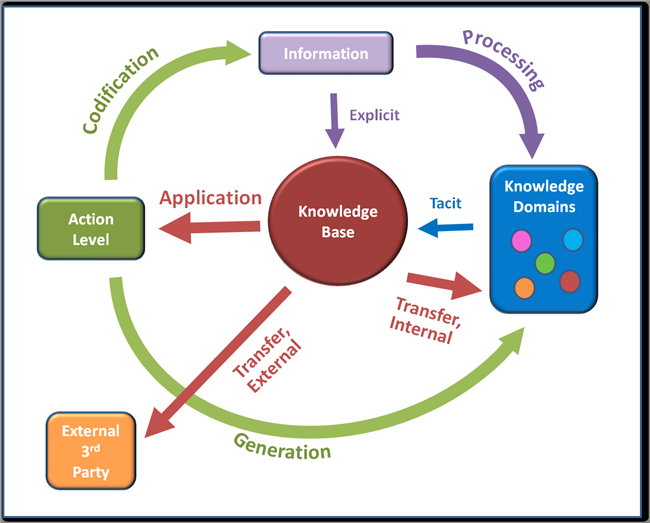
Knowledge management process
Knowledge management (KM) is the process of capturing, developing, sharing, and effectively using organizational knowledge. It refers to a multi-disciplinary approach to achieving organizational objectives by making the best use of knowledge.
An established discipline since 1991 ,KM includes courses taught in the fields of business administration, information systems, management, and library and information sciences. More recently, other fields have started contributing to KM research, including information and media, computer science, public health, and public policy. Several Universities now offer dedicated Master of Science degrees in Knowledge Management.
Many large companies, public institutions and non-profit organisations have resources dedicated to internal KM efforts, often as a part of their business strategy, information technology, or human resource management departments. Several consulting companies provide strategy and advice regarding KM to these organisations.
Knowledge management efforts typically focus on organisational objectives such as improved performance, competitive advantage, innovation, the sharing of lessons learned, integration and continuous improvement of the organisation. KM efforts overlap with organisational learning and may be distinguished from that by a greater focus on the management of knowledge as a strategic asset and a focus on encouraging the sharing of knowledge. It is an enabler of organisational learning.
What are the processes of Knowledge Management (KM)?
KM involves processes that facilitate the application and development of organizational knowledge and aims to create value and to increase/sustain competitive advantage for the organization in 3 dimensions:
Strategic dimension - highlights the strategic importance of knowledge and its management in a company’s strategy
Managerial dimension - highlights organizational knowledge assessment and management
Operational dimension - highlights the development and usage of knowledge and intellectual assets

KM supports and coordinates the generation, codification, transfer and application of individual knowledge in value creation processes. There are generally 4 stages of KM processes:
1. Knowledge Creation/Generation
Companies create a great amount of data and information in their daily business activities. It would be essential for the company to have a system of managing the newly created information so it can be reused to solve new problems or leveraged to value-add to other business activities. For example, high technology companies may often received a lot of feedbacks from customers on their products. This kind of information could be very useful for the R&D team to come up with new improved products.
Companies may find that they cannot meet their knowledge requirement from their available knowledge assets. The gap will have to be filled either by internally developing new knowledge or acquiring the knowledge from external sources. Knowledge creation can only be achieved in a creative environment that encourages teamwork and the use of creative potential. If manage successfully, the process can expand or change the company's knowledge base to meet the company's current and future needs.
2. Knowledge Codification
Data and information need to be collected and analyzed in order to turn them into useful knowledge. This is the stage where tacit knowledge is converted into explicit knowledge and is very critical to the success of the other two stages - application and transfer. Without documenting and codifying tacit knowledge, its transfer for the purposes of learning and utilization, both internally and externally, will be difficult to achieve.
Furthermore, legal protection of these valuable knowledge assets can only be done if the knowledge has been codified. For examples, patent applications require the complete disclosures of the inventions and trade secrets require the demonstration of safe-keeping of documented information. The legal rights come with IP protection offers the company a distinct advantage which can be used to derive revenues from IP licensing or exclusive rights to commercialize.
3. Knowledge Application
It is not unusual for companies to not to know how to generate value from the use of the knowledge assets they have. It is worse when a company does not even know the kind of knowledge it has. Knowledge Management offers a management system for the company to ensure that their knowledge assets when created are properly documented, and that the knowledge in different domain owners will be shared within the organization.
When knowledge assets are documented and shared, knowledge utilization will be facilitated. This is the stage in Knowledge Management where value creation is delivered. By harnessing knowledge from different knowledge domains and competencies across the organization, direct impacts to the missions and goals of the company can be achieved.
4. Knowledge Transfer
One of the advantages of knowledge is that knowledge is dynamic. Knowledge can be adapted and evolved through the processes of learning and sharing. The impact made by individual knowledge is not as great as collective knowledge so sharing within the organization should be encouraged.
When a company has limited capability to effectively use certain knowledge, it would be worthwhile to consider external transfer to third parties who may have the competencies to utilize the knowledge for value creation. For example, a company may have invented a new technology but it does not have the capability to produce products based on such invention. The technology can be licensed to a third party who has the production facilities and the marketing and sales capability to sell the new product. To ensure success of this technology transfer, it is essential that tacit knowledge and procedural knowledge are converted to explicit knowledge for easy learning, adaptation and utilization.
Source: www.k-strategian.com












یک نظر اضافه کنید
شماره موبایل شما منتشر نخواهد شد.زمینه های مورد نیاز هستند علامت گذاری شده *
امتیاز شما